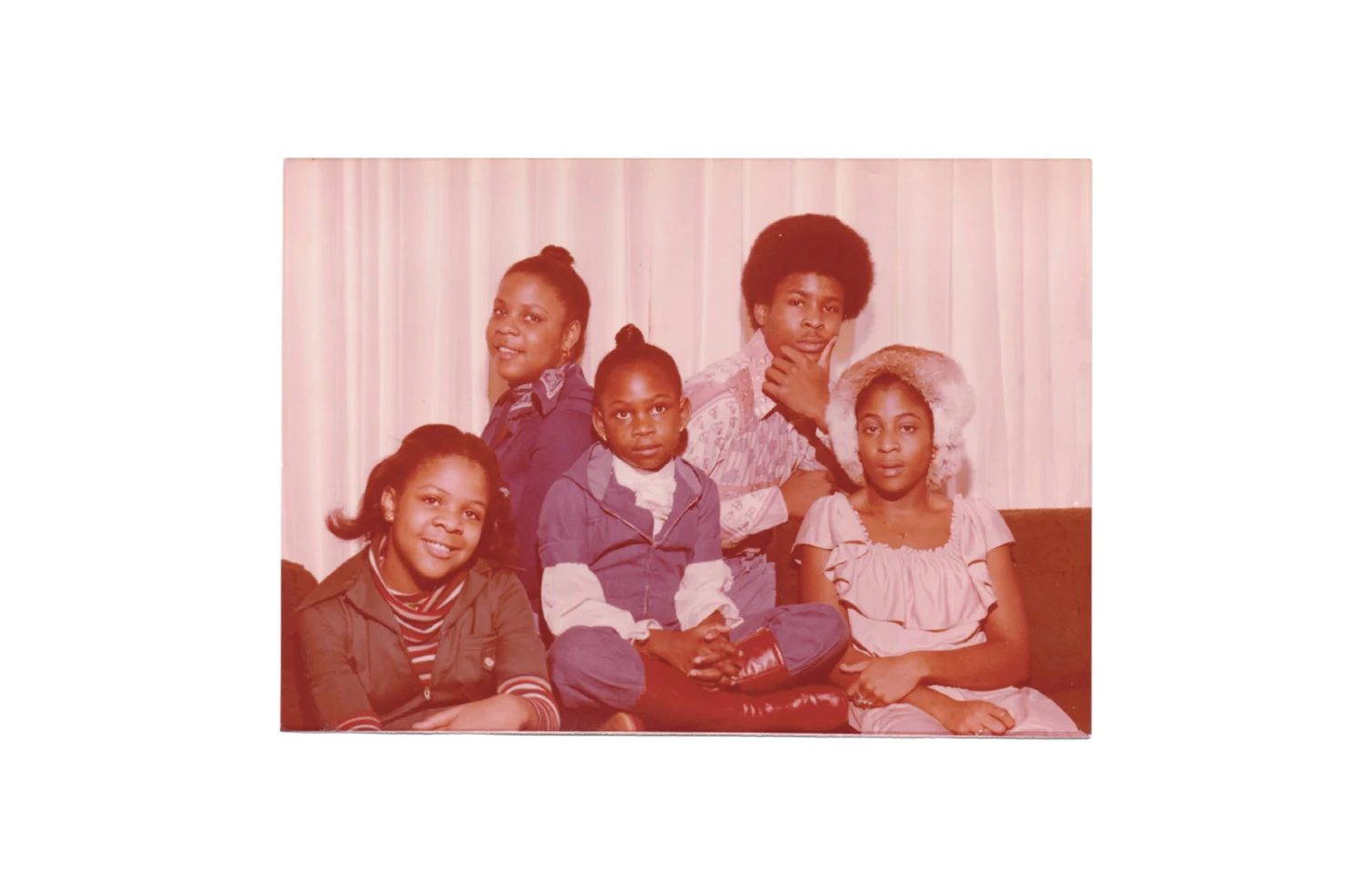origin: the sugarhill gang
‘I’d heard this word hip-hop and just started going: “Hip-hop hippie to the hippie to the hip-hip hop… I was unknown, but figured if I rapped about “foxy ladies and pretty girls” it would get me more attention. It worked. My line about being the “baddest rapper” was wishful thinking, though.”
Guy “Master Gee” O’Brien, The Sugarhill Gang
A STORY
In 1979 I felt positively invincible because I was ten. The chemistry of a ten-year-old is unlike any other. No matter his or her real-life circumstances, a ten-year-old believes beyond common sense or reason that his or her life will someday be right on par with that of a goddess or a god. I was no different. I knew that despite being called "black"—not as a description or an identification, but as a slap in the face each and every day—I was going to grow up and be rich, either by making it rich or marrying rich. With my hand to my heart, I was going to transfigure my ugly duckling self into a beautiful swan. And wouldn’t they all be so sorry? I’d show them! I believed in me because classic children’s books with 10-year-old protagonists (preferably orphaned) taught me what the moral of my story should be: Get grown and get even. If you currently have the pleasure of keeping company with a 10-year-old, watch closely. Ten-year-olds are made of rocket fuel and stars.
When I was 10, my mother and every adult I knew was mad as hell over the cost of gas and cigarettes. I remember adults visiting at my mother’s dining room table and complaining about not having enough gas to give so-and-so a ride to such-and-such a place. I also remember marveling at how those same adults never denied my mother a single thing. In one sentence, she’d sweetly commiserate over the high cost of living and the lack of jobs, then in next she’d tease that poor, sorry, broke-down sap out of his last five dollars along with his very last cigarette. Getting something out of nothing was my mother’s household specialty.
Inside my mother’s house we were always waiting for the check to come. Outside, the world and its previously defined race and gender lines were splintering into cracks and chasms. But we were too broke to notice. Our favorite TV shows featured a wealthy white man who adopted two nappy-headed black boys and a goldfish—and “some good old boys never meaning no harm” who had a car named the General Lee. All the women in my family tuned in to General Hospital to watch Luke rape Laura, each of them wishing that they were Laura on that floor of the skating rink with Herb Alpert’s song Rise playing in the background. “Damn,” my mother said as she blew out a stream of smoke, “He really loves her.”
None of us batted an eye at the complexity of these things. We loved The Jeffersons George Jefferson as much as we loved JJ Walker, as much as we loved Archie Bunker. I could talk about these shows with my white classmates at my all-white school and with my black playmates in my mom’s all-black neighborhood. No code-switching required. Redlining might have segregated our households but not our TVs.
However, music told a different story. I can remember every lyric to Michael Jackson’s first solo album, Off the Wall. My white (albeit British) husband knows all the lyrics to ELO’s Discovery. Off the Wall wasn’t part of my husband's household, and ELO’s album didn’t make it into my family’s discography.
But one of my best music memories was when my oldest sister’s best friend Robin ran down the street to our house to tell us to turn on the radio, and we heard Rapper’s Delight for the first time. We kept the radio on the rest of the day waiting to hear it again and again. We tried to memorize snippets of the lyrics. We argued about whether it was a song or a comedy skit. We wondered if The Sugarhill Gang was indeed a gang like The Bloods or The Crips. Were they even singing? Who was "Wonder Mike" and was he cute? Who were these dudes on the radio talking about us? They had the nerve to mention chicken and greens and macaroni cheese in a song, revealing a truth black folks would never admit in mixed company: some black people can’t cook. We all could relate. They were talking about us, but how? Was this a song or a story?
When I returned to school after Christmas break at my mother’s house I was eager to talk about the song with my white classmates, and for them to finally know that when I was talking about macaroni and cheese, I didn’t mean Kraft. But none of them knew anything about the song. They hadn’t heard of it. They'd spent their vacation memorizing My Sharona. Their mothers probably weren't hustling squares at the dining room table.
Years after their exodus from Egypt, there’s this story about the Israelites being infested with locusts. The infestation was so devastating that a prophet named Joel wrote down the story and said, “Make sure you tell your children, and make sure your children tell their children, and their children tell their children. Don’t let this story die out. Remember what the locusts did. What they left. What they gobbled up and ate. Wake up! Sober up! Get in touch with what is happening around you and weep. An invincible army has overtaken us. They are attacking us like lions. They are ruining everything that grows here. They are killing and destroying everything.” But then, he goes on to tell them that despite the devastation God will make up for all that they've lost. He tells them that the land will be restored and the trees will bear fruit again. But even more, Joel writes, “God will pour out His Spirit on every kind of person. Your sons will prophesy and so will your daughters. Your old men will dream dreams and your young men will see visions.” In lay terms, he’s saying your sons and daughters will rap about this and old folks will not believe the things they will get away with saying.
In 1979, a new Jim Crow had settled into American culture. It told us that the confederate flag was the stuff of heroes; that bigots—both black and white—were harmless; that the only hope for black orphans was white wealth; and that white men who raped white women were desirable. But the most insidious thing that culture was telling us was that black families forced into government housing due to a history of discrimination in housing lending were happy being with their own kind. Even if they never ever made it out of the ghetto, that's okay because the ghetto was entertaining. It was good times.
What Rapper’s Delight did was begin a new kind of oral tradition passed down by prophets who, like Joel, were adamant that people remember what the locusts had done to them and their neighborhoods. Truth be told, we didn’t know that the words of Rapper’s Delight were the rising whispers of prophetic voices about the African-American experience. But that’s pretty much how all movements start, musical and otherwise. No one sees it coming except the prophets themselves. Someone hashtags "Black Lives Matter,” and folks show up to march. Someone hashtags “Me Too,” and the powers that be begin to fall down. And back in 1979, a DJ put on Rapper’s Delight and shouted, “Somebody, anybody, everybody scream!!!!!!!” And everyone on the dance floor screamed.
We are still screaming.
CONTEMPLATION
1. If you are 48 years old or older (my age), what was happening in your family in 1979? Was race a part of what was going on?
2. If you are younger than 48 years old, how old were your parents in 1979? Do you know any stories about your family during that time? Was race a part of those stories?
3. What is the racial demographic of your current neighborhood? If it is a racially homogeneous community, how do you think it came to be? Has it always been?
4. If your neighborhood is racially diverse, meaning that there is a balanced percentage of at least two different races that make up your neighborhood, how do you think it came to be? Is its diversity stable or threatened by gentrification?
5. Since we are discussing Prophets & Saints, what is your family’s spiritual origin? What was the spiritual backstory of your childhood?
6. What is your childhood discography? Was it influenced by race or religion?
MORE
- Why Are All the Black Kids Sitting Together in the Cafeteria: And Other Conversations About Race by Beverly Daniel Tatum, PhD
- The Case for Reparations by Ta-Nehisi Coates, The Atlantic, June 2014
- What I’m Learning from My White Grandchildren—Truths About Race, Anthony Pearson, TEDx Talks
- Social Maps That Reveal a City’s Intersections—and Separations, David Troy, TEDGlobal
- Hiphop Archive & Research Institute at the Hutchins Center, Harvard University










